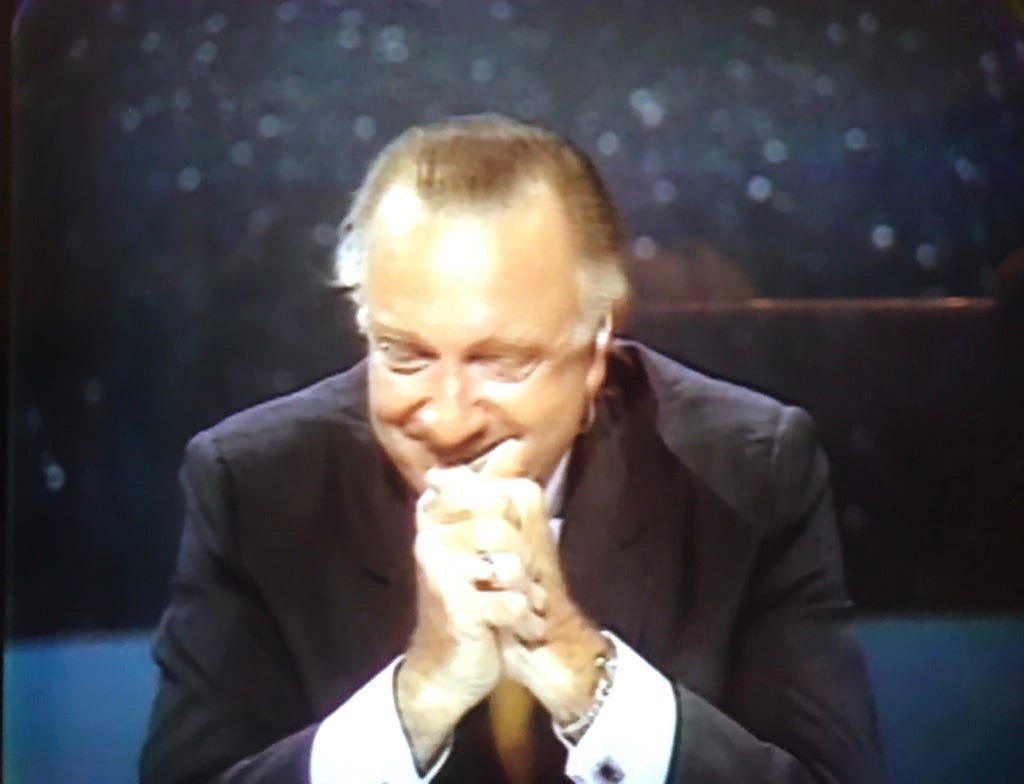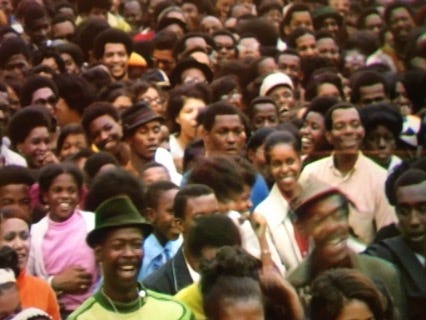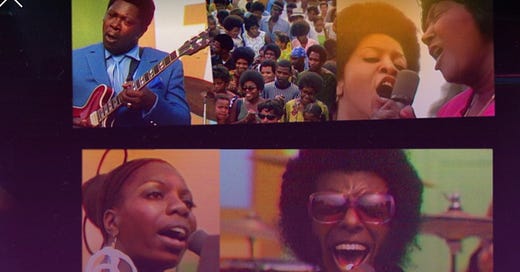Happy Friday and weekend greetings from newShrink!
In a week of very visual news, the story begins in pictures of two summers, 52 years apart.
From Sunday, July 20, 1969:


And this past Tuesday, July 20, 2021:

Reported to us in ways like this, with headlines such as “Best Day, Ever!” (Associated Press)
… then from AP this backlash on Bezos’ huge blind spot (or tin ear), at the news conference where he celebrated his return by saying:
“I want to thank every Amazon employee, and every Amazon customer, because you guys paid for all this.”
… and a note from the archetypal realm (Encyclopedia Britannica online):

More coverage of the Bezos space-ride story, including its vast contrasting shadow elements, is below under news updates and comedy.
the 1969 Summer of Soul film

If you haven’t seen the movie, it’s in theaters and streamable on Hulu. This piece by Salamisha Tillet in The New York Times highlights its scope in “Questlove wants to fill a cultural void.”
Numerous browsable articles and interviews capture and cover the summer-long festival concert series and its backstory in venues from Rolling Stone, NPR and internationally via BBC and The Guardian and a host of other news and cultural media in between. Below are some then-and-now highlights of reflections on the film’s inherent soul and cultural psychology dimensions, from newShrink readers and me.
For me more compelling, goose-bump-evoking, than the contrasts are the parallels between these two American summers and their July 20 space-travel ventures. It’s a haunting sense of “the more things change, the more they stay the same.” Recent newShrink editions and news in general continually highlight such cultural-shadow issues as systemic racism, resurgence of white supremacy in symbols and actions, police shootings of Blacks, disproportionate arrests and incarceration of Blacks, and controversy over funding and teaching of Black history as many different things labeled “critical race theory,” to name a few.
In the news of the current “billionaires’ race” for “space tourism” the voices of many are in the news calling also—not necessarily instead—for use of funds and resources for more down-to-earth, sustainable and in some cases dire needs.
And it wasn’t so different in the 52-year-old film footage.
Pictured here, many attendees and performers at the Festival interviewed about the moon-landing by CBS journalist Bill Plante that Sunday responded:
“Cash is wasted spending money on the moon that could be used to feed people here in Harlem… or people going hungry all over the United States.”
“The moon may be groovy for some people, but we got a serious heroin addiction problem here in Harlem from the pressures of dealing with racism and neglect.”
And a quip from singer Moms Mabley: “Was gonna go with the man to the moon?… I went as far as Baltimore and I got off.”
Similarly chilling parallels are the film’s poignant closing comments about the loss and disregard for Black history—eloquently exhibited by the film’s long obscurity contrasted to the wildly popular, widely covered and memorialized (largely white) Woodstock music festival the same year.
“We hold these truths to be self-evident: That Black history will be erased,” echoes an unseen female voice at the film’s ending.
As several readers emphasized, the movie draws clear connections between gospel music and soul, R&B and finally protest/revolution music. From both a depth (soul) and a clinical/therapeutic psychological standpoint I’m impressed at the sophisticated level of awareness represented in the film.
Several segments, with examples from gospel-soul singers and groups, describe and illustrate the dimension of various levels of consciousness, religious consciousness, and spiritual-rhythmic manifestations of it in the music linked to African heritage and traditions.
Commentators, including the Rev. Al Sharpton, also link soul music with therapeutic relief/release from racist social pressures on Black people. “Gospel was the therapy,” Sharpton says. “We didn’t have psychiatrists. We didn’t know therapy, but we did know Mahalia Jackson.”
Here are some personal reflections on the film and recall of that summer, marking my rising-senior year of high school in a relatively midsized, yet-to-be-booming Southern (NC) city.
Soon after the racial culture-shifting Harlem Festival that summer, a parallel radicalizing of youth in opposition to the Vietnam War escalated mightily that December. That’s when American males of my graduating class-year became the first to reckon with the random birthday-based draft lottery. For just six years until the last draft number was called, this chance number defined future-shaping questions of college or Canada, divinity school or forced medical deferment (through things like self-starvation)… or the front lines of a faraway war, immensely undesirable there and undesired (when not ignored) at home.
Watching the movie’s accurate descriptions of vast inequities in draft and Vietnam War military service of Blacks vs whites prior to 1969, it struck me that the draft lottery to some extent created more of a biracial intersection in protest music and revolution in general in the years leading to the end of the war.
I’ll revisit soul, music and the South more in future posts. But will note here that the film accurately depicts clubs and socializing around music as quite segregated (as described by Billy Davis Jr. of the 5th Dimension, for example). However, in the South I also know both beach music and the region’s high levels of religiosity created earlier intersections between whites and Black soul and gospel music than perhaps in other regions..
In my own experience from the mid-60’s on, not only Motown artists but Southern beach music groups, largely Black musicians, had long filled sand-floored coastal clubs, modest-sized concert venues and city-dives such as Charlotte’s Cellar, all full of mostly white teens dancing the shag. (The list is long: Billy & Barbara and the Georgia Prophets, the Georgia-based Tams, the Embers from Raleigh, Maurice Williams and the Zodiacs of Nashville.) Also not uncommon was visiting of mostly black R&B venues by whites (far less so by Blacks at white social gatherings).
Two lighter notes with the 5th Dimension, from ‘69-’70. First, in an early journalistic coup our award-winning high school newspaper snagged a private interview with Marilyn McCoo by my editor and best friend prior to the group’s Charlotte Coliseum concert. And our 92-member choir did a full performance of “Aquarius/Let the Sun Shine In” in concert, complete with instrumentals and dancing. (This always comes to mind at the sweetly hilarious song-ending to the Steve Carrell comedy film, “The 40 Year-Old Virgin”!)
🦋💙
news updates…
Across the news-scape between space shots and the upcoming Olympics, both against the sobering backdrop of a new surge in the Delta variant of COVID-19, from a psychology and soul standpoint this week’s news-scape is interplay of shadow and light—some of it expressed in such broad strokes it was also a rich week for ironic comedy.
COVID-19 is surging, especially among the unvaccinated, with the Delta variant strain amid vaccine hesitancy:
Delta variant accounts for 83 percent of US COVID 19 hospitalizations (The New York Times).
Delta variant: what we know from science (The New York Times)
…. triggering uncertainty on financial markets domestically and abroad (The Washington Post)
… with effects on today’s opening of the Olympic games in Tokyo. (The Washington Post)
… and athletes from around the world (Today.com)
NC COVID expert op-ed: “As cases rise, the US is throwing the unvaccinated a lifeline. Take it.” (The Charlotte Observer, Dr. David Alan Wohl, Carrboro.)
And back to Bezos, with the space-race, comedy just naturally becomes an element of the story. That’s what happens when hubris—humans mis-identifying ourselves as the gods—is so great and utterly ungrounded. It does what we might call “poking/provoking” the shadow, so the jokes practically tell themselves. (“Sometimes a rocket is…?” Never mind. This would be eye-rolling stuff for Freud, our original scholar on the psyche’s sense of humor.)
A wide range of the various comedians’ take is summarized here. (The Washington Post).
Stephen Colbert captures so many different angles on Bezos, particularly the unfettered hubris, that I won’t attempt to paraphrase. It’s his first topic in the video clip. (I’ll also post a duplicate of this clip as a test in Comments, for anyone who’d rather open it there or post something of your own.)
comedy, psychology and the news…
Humor has many psychological dimensions, many of them useful and therapeutic both individually and culturally, and I’ll revisit the topic more fully later in the summer after the Olympics.
For now will just emphasize the needed relationship and “earthbound” connection of human vs hubris. Even the word human is grounded, sharing and combining early Latin roots for man with those of words like humus (fresh organic dirt), and humility. (With this, especially for therapy process I often picture the pristine white lotus flower, which thrives in swampy terrain but can live and thrive only when nourished by roots deep in dark, slimy muck. For both therapy and life, it’s an image I like to keep nearby.)
Among many ways comedy can open, expand, and break down inner and outer barriers is to carry the opposite pole of extreme hubris, the shadow. It “brings some of that hubris back to earth”—as stories today do quite literally with the space-race news.
Societally perhaps comedians help keep us from mythological Icarus-like flights too close to the sun.
Since I’ll later be looking at comedians and comedy I’ll own here my long affinity and soft spot(s) for Stephen Colbert on this very human level, predating my knowing his comedy work. (I was an occasional earlier fan of The Daily Show with Jon Stewart, but never the Colbert character.) I’m delighted I also find him talented and funny! (And many trailblazing artists can be brilliantly enjoyable, without being exemplary humans or models of psychological maturity and health.)
In a long NPR interview at least a decade ago, Colbert’s levels of self-awareness, disclosure, emotional range and palpable humanity gobsmacked me first as a therapist.
His topic struck personal chords as well: The Eastern Airlines runway crash that killed his father and two closest-age brothers (among 10 older siblings when he was just 10) had devastated many in my home community on September 11, 1974. This was just after my spring graduation from UNC journalism school and in first newspaper job for the smallest of weekly newspapers. The crash’s aftermath and many impacts still reverberated through the community and its legal system during my later daily-newspaper years. (This clip is a powerful 2019 CNN Colbert interview on grief with Anderson Cooper.)
Archetypally and in myth the comedian is something of a court jester and Greek chorus, commenting on the unspoken realities and subtexts in the shadows.
This archetypal and myth aspect of news comes into play particularly with the Olympics. So next week I’ll introduce a decade-long favorite expert, newShrink reader and human—another whom I have never met IRL: Lehigh University journalism professor, author and journalist Jack Lule. I highly recommend his book, Daily News, Eternal Stories: The Mythological Role of Journalism. (Chapters on the Scapegoat and the Hero are particularly apt for today’s stories.)
postcards

It also echoes Dante (a favorite of mine, as you may recall.)
In his three-part Divine Comedy story-poem about his journey through hell and back, a verse describing a glimpse up to distant stars has been the desperately needed glimmer-of-hope at each turning point—first out of Inferno, then Purgatorio.
And at the culmination of Dante’s ordeal, and thus the poem, his joyous emergence at the end of Paradiso is described this way:
“My desire and will were moved already—like/a wheel revolving uniformly—by the Love that moves the sun and the other stars” (Paradiso 33, 145.)
Which loops us back, with a favorite among my eternal song-lyric ear-worm connections, to 1969 Summer of Soul, the 5th Dimension and their (intentional or unconscious) paraphrase in “Aquarius/Let the Sun Shine In”:
“…then peace will guide the planets/and Love will steer the stars…”
(Some space journeys nail the landing better than others.)
🌟
And, that is all I have! Talk to you next week.
🦋💙tish
… it is important that awake people be awake,
or a breaking line may discourage them back to sleep;
the signals we give — yes or no, or maybe —
should be clear: the darkness around us is deep.
— William Stafford, “A Ritual to Read to Each Other”






https://youtu.be/8_iO_3R1yu8